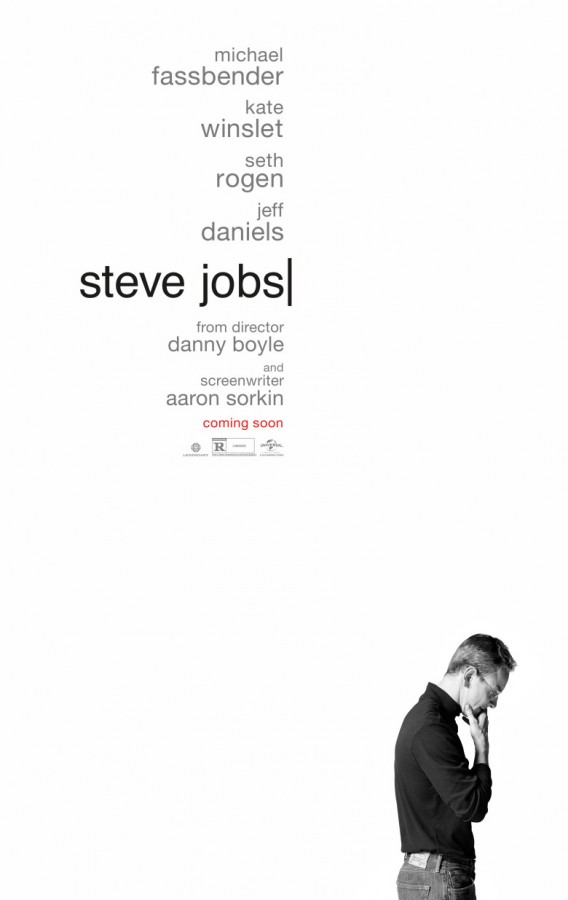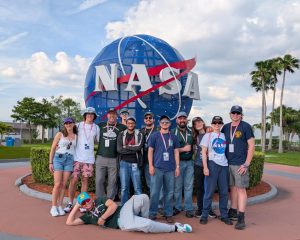“Steve Jobs” does the innovative man justice
4/5 stars
November 4, 2015
Improving from the Ashton Kutcher’s disappointing performance of Steve Jobs a few years ago isn’t a hard task, and Michael Fassbender exceeded my expectations with his performance as the enigmatic businessman. Although this movie doesn’t encompass Steve Job’s life like Ashton Kutcher’s version, the storytelling was well thought out, and created an elusive storyline that made me crave more after the credits rolled. The movie was efficient with its pacing and created a suspenseful plot that has innovated how to express the life of a complicated mind such as Steve Jobs.
This movie has a lot going for it just by looking at who was involved in the production. On the acting side, there is Michael Fassbender as Steve Jobs, Seth Rogan as Steve Wozniak, Jeff Daniels as John Sculley and Kate Winslet as Joanna Hoffman. Pair that with the director of Slumdog Millionaire and Trainspotting, Danny Boyle, in conjunction with one of the greater screenwriters in recent cinema, Aaron Sorkin; this movie was destined from the start to be a great rendition of Steve Job’s life.
Fassbender especially had a great performance. He was able to show depth in his acting by being able to progress with the script better than many actors could have done with a character like Jobs. As well, his whole look and behavior fit Jobs’ persona and was able to pronounce his struggles throughout his personal and business life clearly. He articulated Jobs’ internal struggles with conviction, and this is without a doubt one of his best performances.
As for the storytelling, the film followed Jobs through his intimate interactions between close friends, coworkers and family. The catch was that the film only showed interactions before major Apple and NeXT keynote events presenting new technology and innovation created by Jobs’ companies. The characters had to inference past events between keynotes, and were able to provide enough context to situations vague enough for audiences to follow banter, but not become distracted by unimportant details.
This combined with the cinematography of the film made the viewing experience very unique and shined through when tense interactions between characters occurred. For instance, there were many instances where Steve Wozniak and Steve Jobs were arguing about acknowledging the Apple II at each one of the keynote events Jobs hosted. The Apple II is a personal computer released in 1977 that kept Apple afloat for almost 2 decades. Every time Wozniak told him that he should recognize how important the Apple II has been to the company’s life, Jobs’ denied the computer’s involvement in the success of the company and continuously shut down Wozniak.
When Wozniak was talking to Jobs’ at the NeXT keynote, they talked amongst the San Francisco Davies Symphony pit performance area. Throughout this scene, the intensity between the two rose as the conversation went on; a violin orchestra playing in the background created more intensity as the conversation continued, and the entire scene explained how Jobs’ saw himself as the orchestra leader of his staff. Although Wozniak didn’t understand at first, Jobs’ kept demining Wozniak’s extensive innovations made as part of Apple by calling him the leader of his section in Jobs’ orchestra, rather than acknowledging his efforts.
Although this movie was able to create a great story with wonderful pacing and great scripting, this nonfiction story seemed to be missing a lot of Jobs’ characteristics and attributes that really contributed to his strange and alternative attitude in real life. His belief in homeopathic medicine and Buddhist meditation should have been accentuated in this film, but wasn’t mentioned at all; all though it was a major part of his personality in real life. In the film, he was seen as a cold business man, missing many of his major personality traits that were shown in his written biography and the Ashton Kutcher movie.
Although the movie was missing many of the major personality traits of Jobs’, the film was able to tell a captivating story using an unusual pacing style; focusing on the keynotes and how people would tell him how they actually felt about him before the events, accentuating how it affected his life. This film is without a doubt one of the best movies this year thus far, yet has completely tanked in the box office.
The film only made $521,522 in its opening weekend, and has only made a little less than $15 million over the past couple weeks after release. The movie hasn’t even made it halfway to its budget yet, being roughly $30 million. Maybe it’s because there was a Steve Jobs movie in 2013 as soon as the man passed, but virtually no one has gone to the theaters to see the new Jobs film. Although this movie should be one of the more talked about films of the season, it has been largely swept under the vast cinema library this year.
This shouldn’t hold you back from going to see this film in theaters. The movie is the best rendition of Steve Jobs’ life so far in cinema history, and deserves vastly more recognition by the public. Although not perfect, this movie excels in so many different ways, and unravels a story that is pivotal to the history of personal computing. If you are searching for a piece of cinema worth watching in theaters, this one is worth more than the price of the ticket.


















